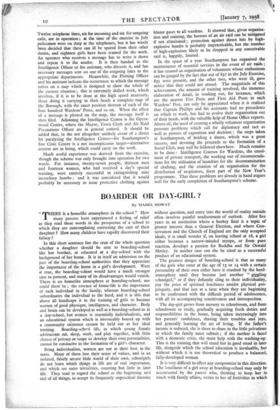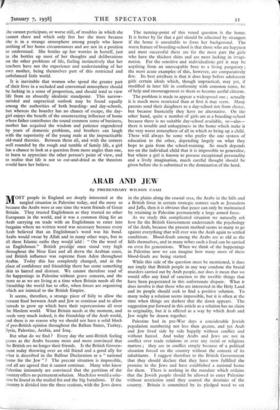BOARDER OR DAY-GIRL ?
By MABEL HOWAT
"THERE is a homelike atmosphere in the school." How many parents have experienced a feeling of relief as they read these words in the prospectus of a school to which they are contemplating entrusting the care of their daughter ? How many children have rapidly discovered their fallacy ?
In this short sentence lies the crux of the whole question whether a daughter should be sent to boarding-school like her brother, or educated at a day-school with the background of her home. It is in itself an admission on the part of the boarding-school authorities that they appreciate the importance of the home in a girl's development. Were it true, the boarding-school would have a much stronger case to present, and many of its disadvantages would vanish. There is no homelike atmosphere at boarding-school, nor could there be ; the essence of home-life is the importance of each individual in the family, whereas boarding-school subordinates the individual to the herd, and it is this that above all handicaps it in the training of girls to become women of good physique, intelligence, and character. Body and brain can be developed as well at a boarding-school as at a day-school, but woman is essentially individualistic, and an educational system which is irrevocably bound up with a community existence cannot be held out as her ideal training. Boarding-school life, in which young female adolescents eat, sleep, work, and play together, with little chance of privacy or scope to develop their own personalities, cannot be conducive to the formation of a girl's character.
Being individualists, women are not at their best in the mass. Many of them lose their sense of values, and in an isolated, falsely secure little world of their own, schoolgirls do not learn which things in life are of real importance, and which are mere trivialities, counting but little in later life. They tend to regard the school as the beginning and end of all things, to accept its frequently unpractical theories without question, and entry into the world of reality outside often involves painful readjustment of outlook. After five years in an institution where a hockey final is a topic of greater interest than a General Election, and where Con- servatism and the Church of England are the only accepted ideals, it is small wonder if on leaving school at i8, a girl either becomes a narrow-minded myope, or from pure reaction, develops a passion for Buddha and Sir Oswald Mosley. In neither case can she be cited as a successful product of an educational system.
The greatest danger of boarding-school is that so many of the girls who enter at the age of 13 or 14 with a certain personality of their own either have it crushed by the herd- atmosphere until they become just another " giggling schoolgirl," or if they defiantly cling to their individuality, pay the price of spiritual loneliness amidst physical pro- pinquity, and that just at a time when they are beginning to be confronted with the difficult period of adolescence, with all its accompanying sensitiveness and introspection.
The day-girl grows from nursery to schoolroom, and from schoolroom to study, gradually acquiring fresh duties and responsibilities in the home, being taken increasingly into her parents' confidence, sharing their troubles and joys, and generally learning the art of living. If the father's income is reduced, she is there to share in the little privations to which the family must submit ; if the mother is faced with a domestic crisis, she must help with the washing-up. This is the training that will stand her in good stead in later life, alongside which the school education is invaluable, but without which it is too theoretical to produce a balanced, fully-developed woman.
It is very difficult to effect any compromise in this direction. The loneliness of a girl away at boarding-school may only be accentuated by the parent who, thinking to keep her in touch with family affairs, writes to her of festivities in which she cannot participate, or worse still, of troubles in which she cannot share and which only fret her the more because she is in a strange atmosphere among people who know nothing of her home circumstances and are not in a position to understand. She bottles up her worries in herself, just as she bottles' up most of her thoughts and deliberations on the other problems of life, feeling instinctively that her teachers have not the experience and understanding of her own mother, being themselves part of this restricted and unbalanced little world.
It is inevitable that women who spend the greater part of their lives in a secluded and conventual atmosphere should be lacking in a sense of proportion, and should tend to view life from an absurdly idealistic standpoint. This narrow- minded and unpractical outlook may be found equally among the authorities of both boarding- and day-schools, but whereas the boarder has no chance of escape, the day- girl enjoys the benefit of the counteracting influence of home where father contributes the sound common sense of business, mother has acquired the wisdom and patience engendered by years of domestic problems, and brothers can laugh with the superiority of the young male at the impracticable old-maid theories. Between them all, and with the corners well rounded by the rough and tumble of family life, a girl has a chance to look at a question from more angles than one, to learn to appreciate the other person's point of view, and to realise that life is not so cut-and-dried as the theorists would have her believe. The turning-point of this vexed question is the home. It is better by far that a girl should be educated by strangers if the home is unsuitable to form her background. The worst feature of boarding-school is that those who are happiest and most successful there are for the most part the girls who have the thickest skins and are most lacking in imagi- nation. For the sensitive and individualistic girl it may be anything from an unescapable bore to a living purgatory ; the most acute examples of this, however, are comparatively few. Its best attribute is that it does keep before adolescent girls certain ideals which, though unpractical, may yet, if modified in later life in conformity with common sense, be of help and encouragement to them to become useful citizens.
The problem is made to appear a widespread one ; actually it is much more restricted than at first it may seem. Many parents send their diughters to a day-school not from choice, but because financially they have no alternative. On the other hand, quite a number of girls are at a boarding-school because there is no suitable day-school available, or—alas- there is trouble and unhappiness in the home which make it the very worst atmosphere of all in which to bring up a child. There will always be some who prefer the one system of education to the other, depending largely on what they hope to gain from the school-training. So much depends too on the individual child that it is impossible to generalise, but where a girl is known to possess exceptional personality and a lively imagination, much careful thought should be given before she is submitted to the domination of the herd.










































 Previous page
Previous page